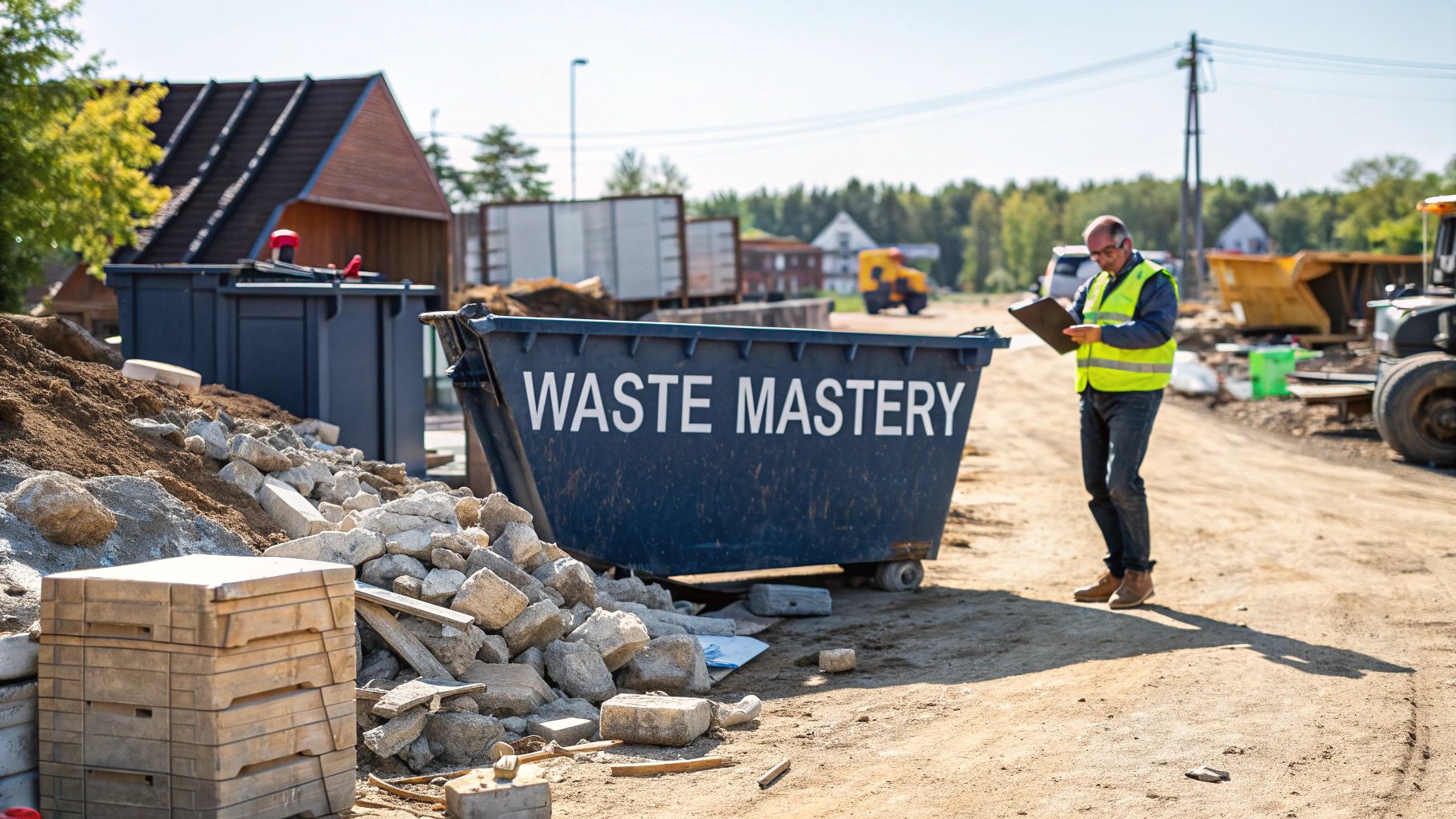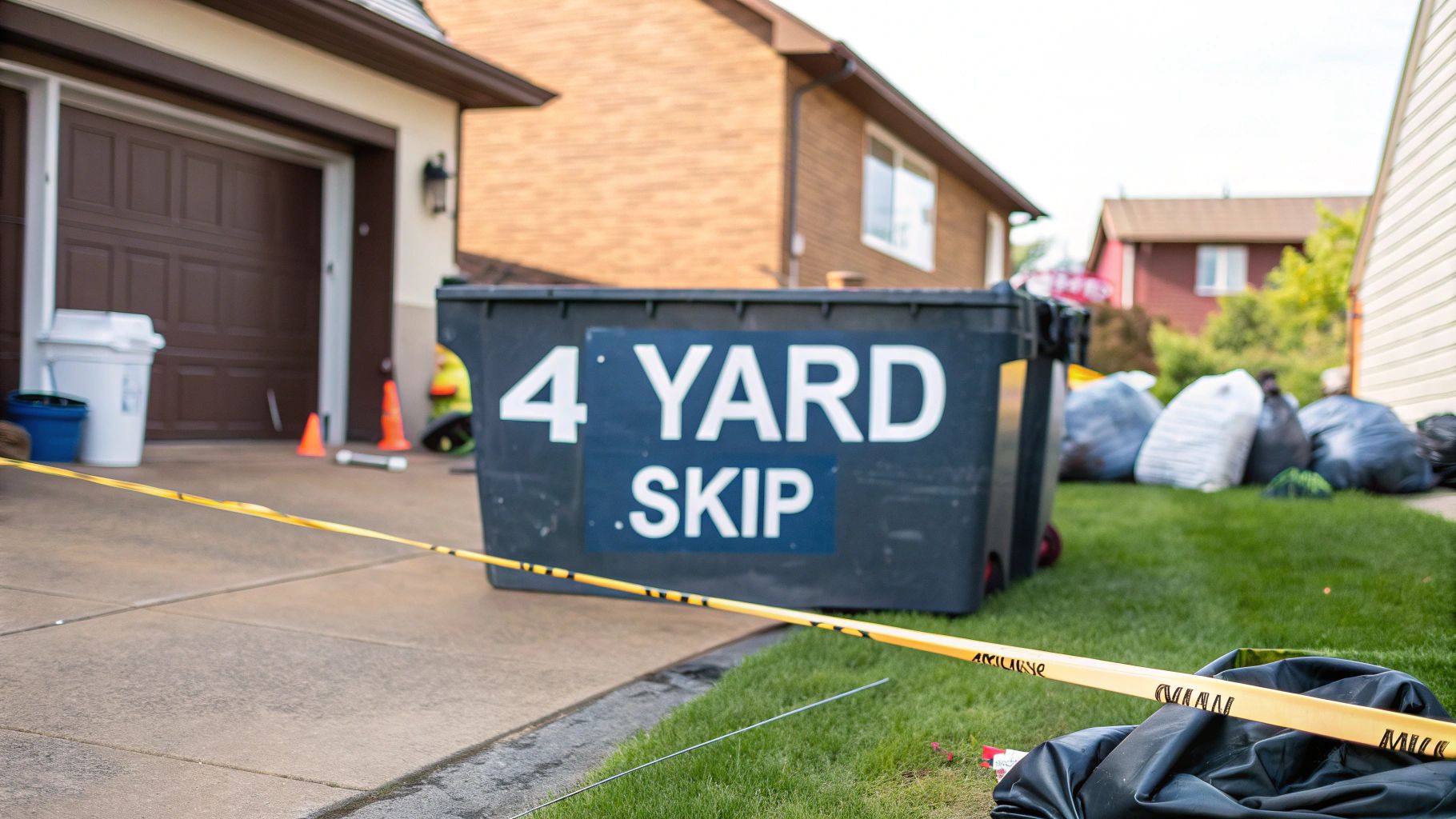UK Commercial Waste Collection Services Explained | The Waste Group
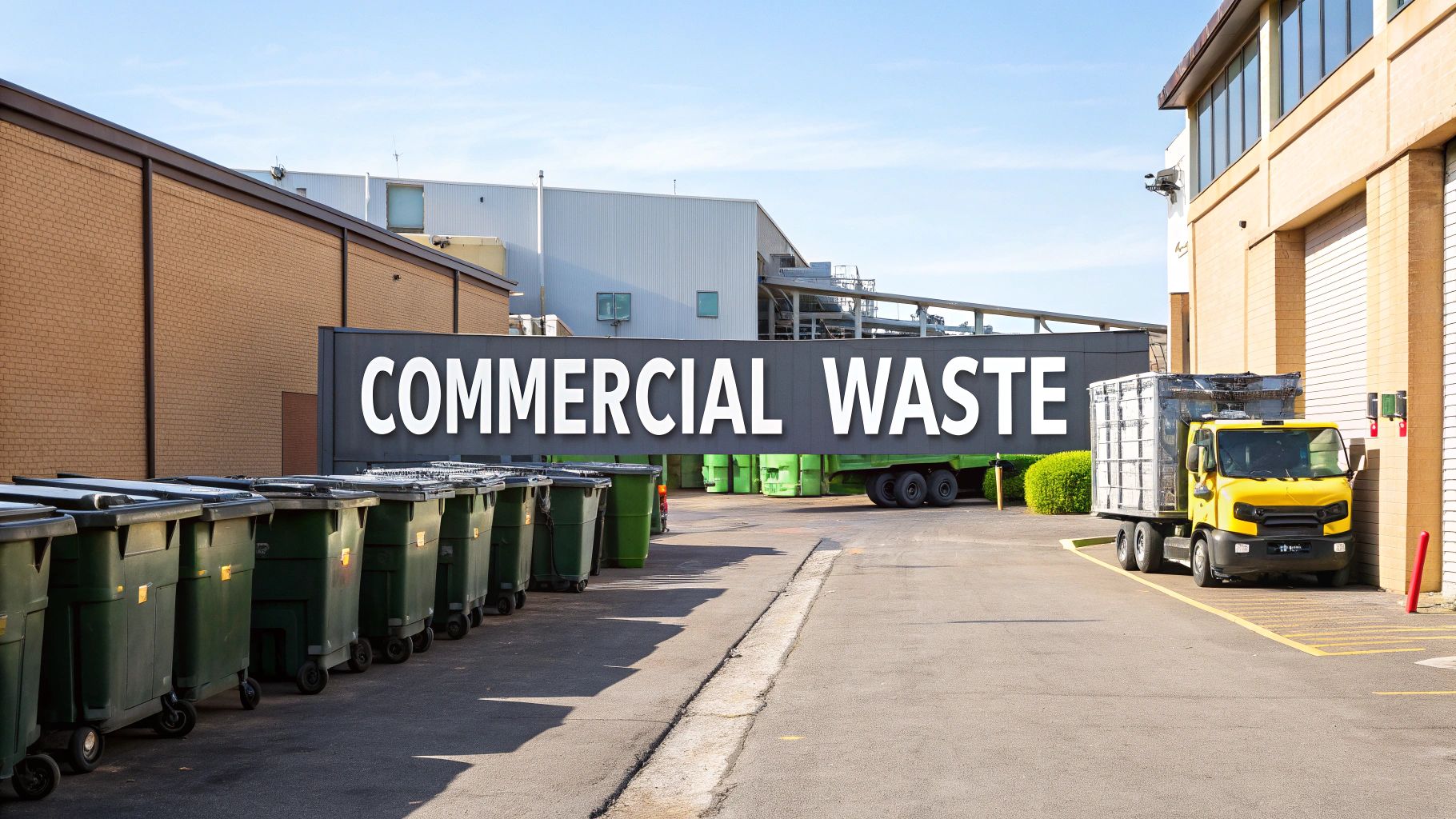
UK Commercial Waste Collection Services Explained
Every business creates rubbish, but what you do with it is more complicated than just putting the bins out. Commercial waste collection is the professional service that handles everything your business throws away. Unlike the wheelie bin at the end of your driveway, commercial waste is legally regulated. It requires a specialised approach to handling, documentation, and disposal to keep you compliant and protect the environment.
It’s not just a case of a bigger bin lorry showing up; it’s a fully managed service designed around your specific business needs.
What Exactly Is Commercial Waste Collection?
Think of it as your home’s bin day, but for your business—with much higher stakes and stricter rules. It’s a dedicated service built for the waste produced by any commercial activity, whether you’re running a bustling restaurant, a small office, or a busy high-street shop.
And we’re not just talking about leftover food or empty packaging. Commercial waste is a massive category covering everything from cardboard boxes and plastic wrapping to old office chairs and manufacturing by-products. The bottom line is, if your business creates it, it’s commercial waste, and you are legally on the hook for getting rid of it properly.
More Than Just a Bin Lorry
It’s a common mistake to think that commercial waste collection is just a scaled-up version of what the council does for homes. The reality is far more structured. The service is a partnership with a licensed waste carrier who provides the right bins for your different types of waste and collects it on a schedule that works for you.
This whole system is built on a few core ideas:
- Compliance: Making sure your business follows all environmental laws, including the crucial ‘Duty of Care’ regulations.
- Efficiency: Setting up a reliable schedule so your bins never overflow and cause a headache for your operations.
- Sustainability: Focusing on recycling and diverting as much waste away from landfill as possible.
A professional commercial waste collection service is your compliance partner. They take the headache of waste legislation off your plate, turning a legal chore into a smooth, simple part of your daily operations so you can focus on running your business.
Why Specialised Services Are a Legal Necessity
For any UK business, using a professional commercial waste collection service isn’t optional—it’s the law. You can’t just sneak your business rubbish into domestic bins or public litter bins. Getting caught doing that can land you with some seriously hefty fines.
This legal framework is there for a good reason: to make sure waste is handled responsibly, protecting both public health and the environment. A licensed provider gives you the essential paperwork, like Waste Transfer Notes, which prove your waste was managed correctly from the moment you created it to its final disposal. This documentation is your key to proving you’re compliant and giving you complete peace of mind.
Choosing Your Waste Collection Services
Picking the right commercial waste collection service is a bit like packing a toolkit. A builder doesn’t need the same tools as a chef, and the same logic applies to managing your business’s rubbish. There’s no one-size-fits-all solution, and getting it right from the start is the key to staying compliant, efficient, and in control of your costs.
The first step is simply to understand what you’re actually throwing away. This is often called a waste audit, but it’s really just a close look at your bins. A busy high-street café, for instance, will have lots of food scraps and glass bottles. An office, on the other hand, will mostly produce paper, cardboard, and maybe some plastic packaging. Each of these needs a different home.
The Core Service Options
Most waste providers offer a menu of services designed for specific materials. By mixing and matching, you can build a complete waste plan that perfectly suits your business. The most common options you’ll come across are:
- General Waste Collection: This is the bin for everything that can’t be recycled. Because it’s usually heading to a landfill or an energy-from-waste plant, this is often the most expensive service. The main goal is always to keep this bin as empty as possible.
- Dry Mixed Recycling (DMR): A hugely popular choice for offices, shops, and warehouses. DMR bins take a blend of clean, dry recyclables like paper, cardboard, plastic bottles, and metal cans all in one go. It’s a straightforward way to seriously improve your recycling rates.
- Food Waste Collection: Absolutely essential for any business that handles or serves food, from restaurants and pubs to staff canteens. Separating food waste isn’t just good practice; it’s often a legal must. This allows it to be transformed into useful products like compost or even renewable energy.
A Comparison of Commercial Waste Collection Services
To help you visualise how these services fit different business needs, here’s a quick breakdown of the most common options.
| Service Type | Waste Materials Included | Ideal For Which Businesses |
|---|---|---|
| General Waste | Non-recyclable items, contaminated packaging, unrecyclable plastics. | All businesses, but the aim is to minimise its use. |
| Dry Mixed Recycling (DMR) | Paper, cardboard, plastic bottles, metal tins and cans (all clean and dry). | Offices, retailers, warehouses, schools, and light industrial units. |
| Food Waste | All cooked and uncooked food scraps, plate scrapings, peelings, tea bags. | Restaurants, cafés, pubs, hotels, schools, and offices with canteens. |
| Glass Collection | Glass bottles and jars (separated by colour if required). | Pubs, bars, restaurants, hotels, and event venues. |
| WEEE | Old computers, printers, phones, kettles, fridges, anything with a plug or battery. | Offices, IT companies, retailers, and manufacturing businesses. |
| Confidential Waste | Sensitive paper documents, client records, financial statements. | Law firms, accountants, healthcare providers, and any business handling private data. |
By selecting the right combination, you ensure that each type of waste is handled correctly and cost-effectively from the get-go.
Specialised Waste Streams
Of course, it’s not always as simple as paper and plastic. Many businesses create waste that needs special attention because of what it’s made of or the rules surrounding its disposal. Getting this wrong can lead to hefty fines and cause real environmental damage.
A perfect example is Waste Electrical and Electronic Equipment (WEEE). This covers anything with a plug or a battery – from old office PCs and printers to kitchen appliances. These items can’t just be tossed into the general waste because they often contain hazardous materials like lead and mercury. In fact, e-waste is a massive global problem, accounting for a shocking 70% of all toxic waste. Proper disposal is non-negotiable.
Other specialist services you might run into include:
- Glass Collection: A must-have for pubs, restaurants, and bars dealing with a mountain of bottles and jars every week.
- Clinical Waste: For healthcare clinics, tattoo studios, and beauty salons, requiring legally compliant and safe disposal methods.
- Confidential Waste: For any business handling sensitive documents that need to be securely shredded and destroyed to protect privacy.
This chart quickly compares what happens when businesses manage waste themselves versus when they bring in the professionals.
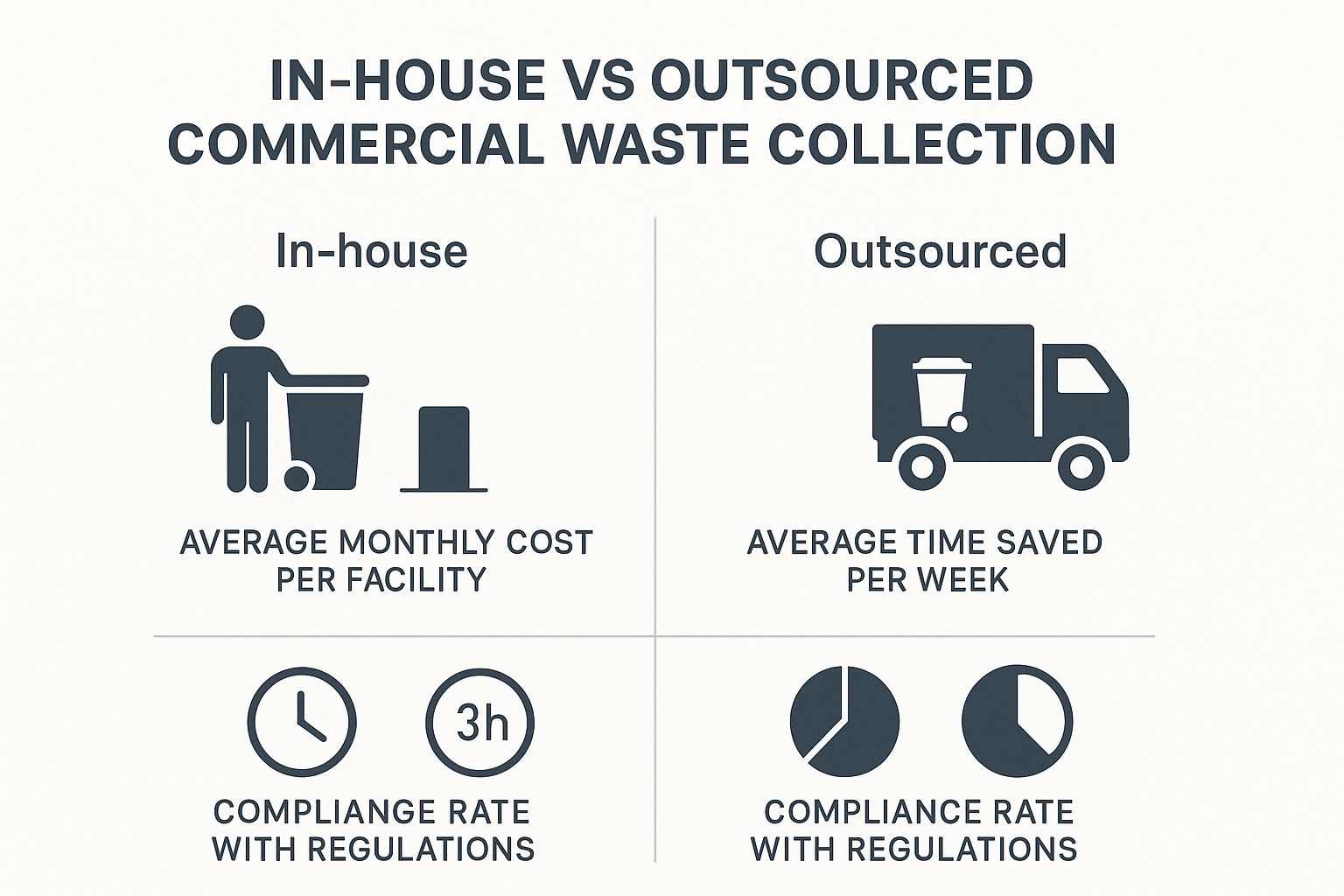
The difference is clear. Working with an expert partner doesn’t just save you time and hassle; it makes staying on the right side of the law much easier.
By correctly identifying each type of waste your business produces, you can select a combination of commercial waste collection services that forms a compliant, cost-effective, and environmentally responsible strategy. This isn’t just about ticking boxes; it’s about building an efficient system that works for your unique operations and supports your sustainability goals. Choosing the right mix is the foundation of smart waste management.
Understanding Your Legal Waste Duties
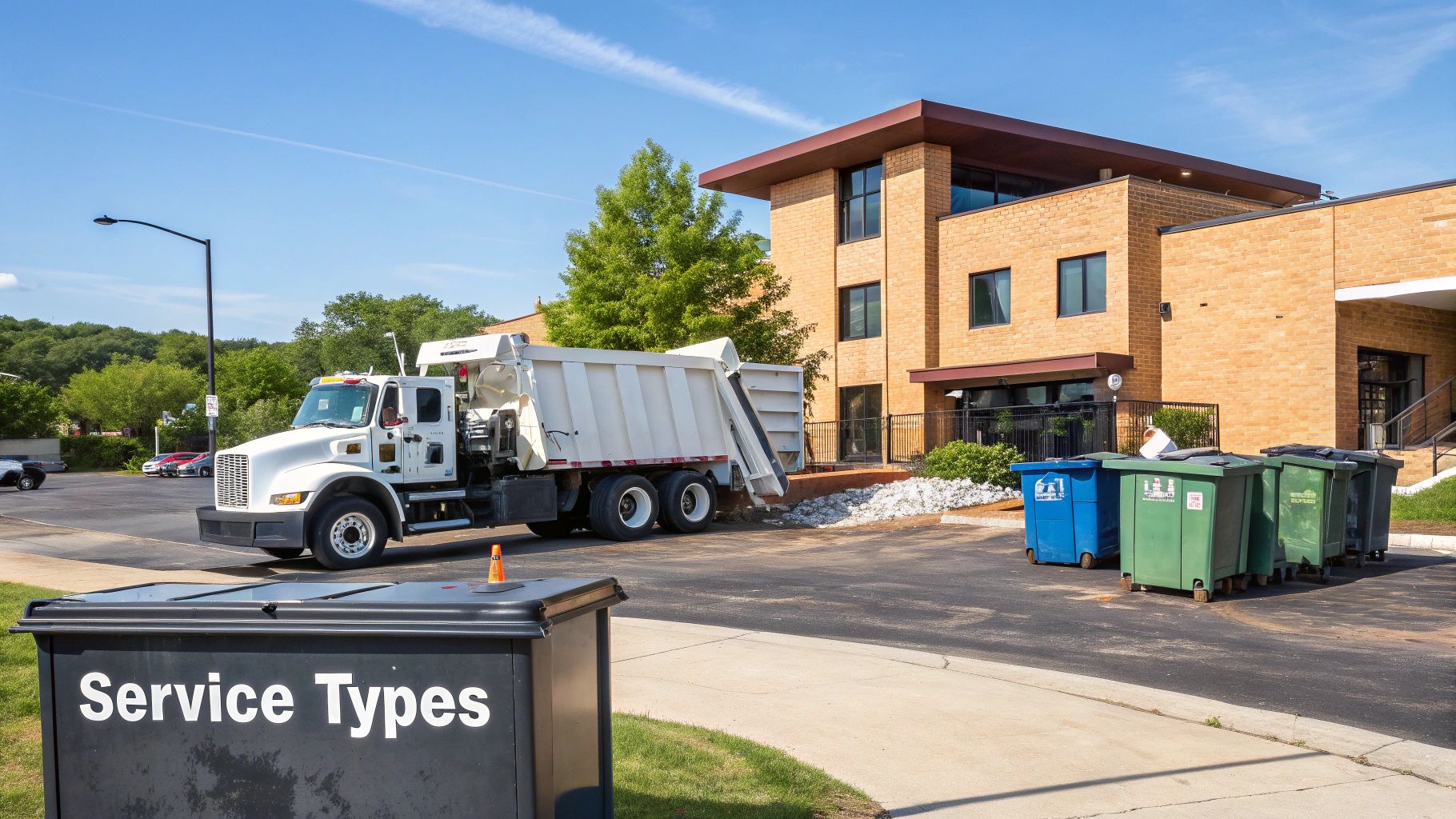 Trying to get your head around the rules for commercial waste can feel like you’re navigating a minefield. But it all boils down to one powerful principle: your Duty of Care. This isn’t just a suggestion; it’s a non-negotiable legal responsibility for every single business in the UK, no matter how big or small.
Trying to get your head around the rules for commercial waste can feel like you’re navigating a minefield. But it all boils down to one powerful principle: your Duty of Care. This isn’t just a suggestion; it’s a non-negotiable legal responsibility for every single business in the UK, no matter how big or small.
Put simply, you are legally accountable for your waste from the moment you create it until it’s properly disposed of. You can’t just pass it on and wash your hands of it—the responsibility sticks with you. This whole system is designed to make sure all waste is managed safely, without harming people or the planet.
This is exactly why you must always use a registered waste carrier for your commercial waste collection services and steer clear of tempting offers from unlicensed “man with a van” operators.
Your Core Compliance Checklist
To meet your Duty of Care, you need to take a few specific, practical steps. Getting this wrong can lead to hefty fines from the Environment Agency, so nailing the fundamentals is crucial for protecting your business and its reputation. Think of it as your waste management MOT—an essential check-up to keep you on the right side of the law.
Here are the absolute must-dos:
- Partner with a Licensed Carrier: You can only hand your waste over to an operator who holds a valid waste carrier licence. Don’t be shy—always ask to see their certificate and double-check their registration online.
- Secure a Waste Transfer Note (WTN): You need a WTN for every single collection. This legal document is your proof of transfer, detailing what the waste is, how much of it there is, and who’s taking it away.
- Keep Your Records Safe: The law says you must keep copies of all your WTNs for at least two years. These documents are your evidence of compliance if an inspector ever pays you a visit.
Your Waste Transfer Note is more than just a piece of paper; it’s your legal shield. It proves you’ve acted responsibly and handed your waste to a legitimate, authorised professional, ticking a critical box in your Duty of Care. Understanding how responsible waste disposal is vital for your local community is key to your business’s good standing.
The Impact of Simpler Recycling Rules
Waste legislation doesn’t stand still; it’s always evolving to push for better environmental results. A huge development is the government’s Simpler Recycling regulations, which have really shaken up how businesses in England handle their waste. Since 2025, any business with ten or more full-time employees must have separate collections for different types of waste.
This means you need to arrange distinct collections for things like food waste, paper and cardboard, and other dry recyclables such as plastics, metal, and glass. To get to grips with these new duties, you can explore more on the 2025 waste management changes. Navigating environmental rules can be complex, and some businesses find that dedicated carbon compliance software helps them stay on track.
Ultimately, following these rules isn’t just about avoiding penalties. It’s about playing your part in the UK’s bigger mission to build a more sustainable, circular economy.
What Drives Your Waste Collection Costs
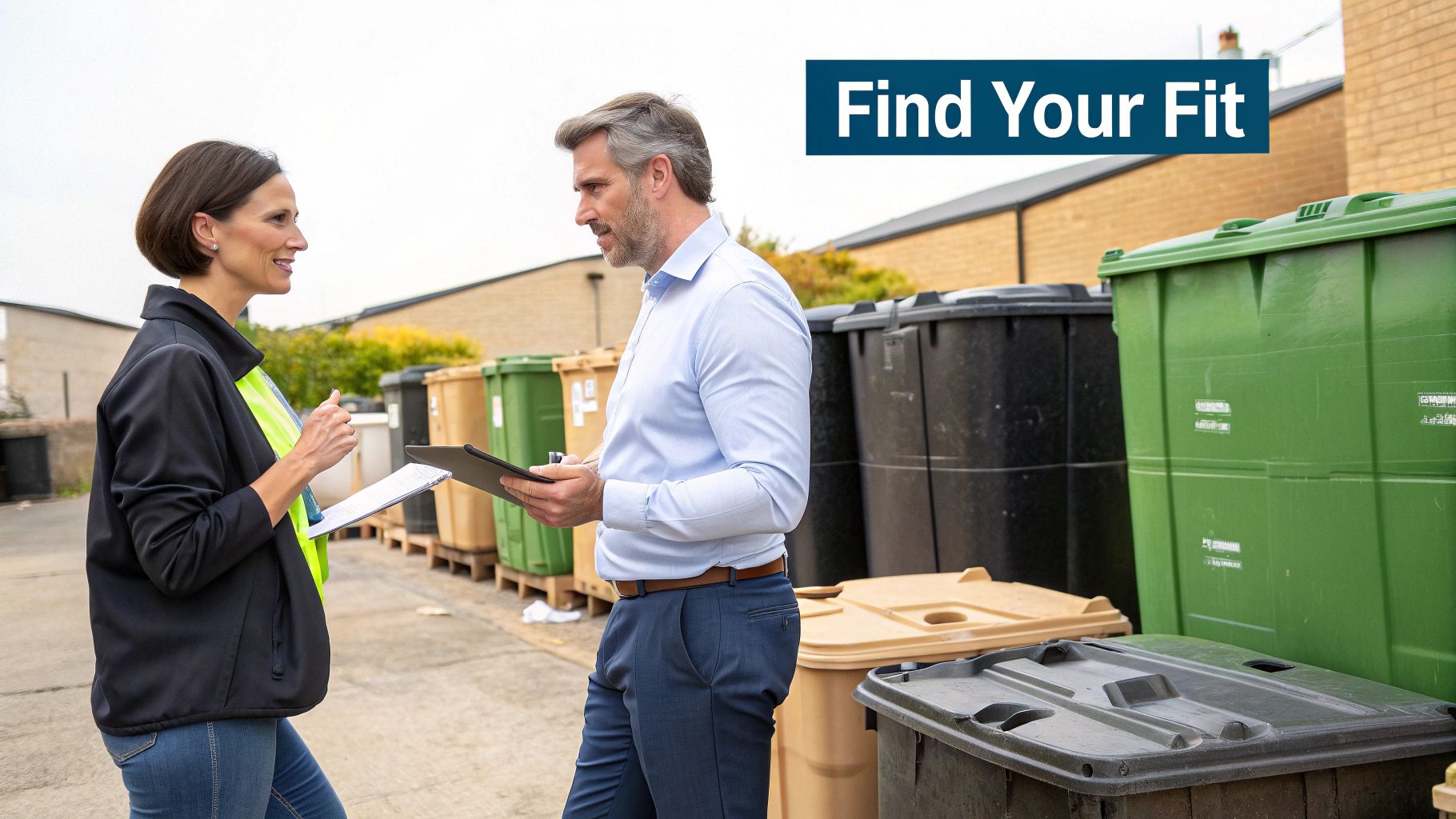
Trying to figure out the price tag on your commercial waste collection services is a must for keeping your budget in check. But here’s the thing: it’s not like a fixed utility bill. Think of it more like a custom service plan, where the final figure is shaped by a handful of key factors that reflect exactly what your business does and what it throws away.
Your quote isn’t just a number plucked from thin air; it’s a careful calculation based on your specific needs. Once you get to grips with what these factors are, you can read any quote with confidence, ask the right questions, and even spot clever ways to make your waste management more affordable. The goal is simple: pay for what you need, and not a penny more.
Waste Type and Weight
Without a doubt, the single biggest influence on your costs is what you’re throwing away. Different types of waste have completely different disposal fees, and it can make a massive difference to your bill.
General waste is almost always the most expensive to get rid of. Because it’s usually destined for landfill or an energy-from-waste plant, it’s subject to hefty landfill taxes and processing costs.
On the other hand, well-sorted recycling is far cheaper for providers to handle. This is your secret weapon for cutting costs. Getting serious about separating your recyclables properly means less volume in that pricey general waste bin, which is the number one way to reduce your overall spend.
Weight plays a huge part, too. Heavier materials naturally cost more to transport and dispose of. For example, a bin filled to the brim with glass bottles will cost a lot more to empty than one packed with lightweight cardboard, even if they’re the exact same size.
Collection Frequency and Bin Size
It stands to reason that how often your bins are collected and the size of the containers you use are directly tied to your monthly invoice. A big 1100-litre wheelie bin collected every week will, of course, cost more than a small 240-litre bin picked up every fortnight.
- Higher Frequency: More collections mean more fuel and labour for your provider, and that cost is passed on to you.
- Larger Bins: Bigger containers come with higher rental fees and take more resources to empty.
The trick is to find the perfect balance. You need collections that are frequent enough to stop your bins from overflowing (a real headache for any business) but not so frequent that you’re paying for half-empty containers to be taken away. A good waste partner will work with you to find that sweet spot.
Your business’s geographical location also plays a role. Businesses in remote areas may face higher charges due to the increased travel time and fuel needed for collections, whereas those in dense urban centres might benefit from more competitive pricing as collection routes are more efficient.
Finally, don’t forget the small print. Things like the length of your contract and any potential extra charges, such as fees for overweight bins or container rental, will be factored into the final price. By understanding all these moving parts, you can team up with your provider to build a service that’s both effective for your business and kind to your budget.
Beyond Compliance: The Benefits of Smart Waste Management
Let’s be honest, managing your commercial waste can sometimes feel like just another chore to tick off the list. But what if you started looking at it differently? Instead of a legal headache or an operational cost, think of it as a powerful strategic tool for your business.
Moving beyond simple compliance means reframing how you see waste collection. It’s about treating what you throw away not as rubbish, but as a potential resource. When you actively reduce what goes to landfill, you’re not just cutting harmful greenhouse gas emissions; you’re building a reputation that resonates with today’s eco-conscious customers. Good waste management is an investment in your company’s future.
Building a Sustainable Brand Image
In a crowded market, what your business stands for really matters. A visible commitment to sustainability can be a huge differentiator, attracting customers who actively choose to support environmentally responsible companies. Proper recycling and resource conservation are powerful signals that you care about your impact.
By embracing smart waste practices, you transform a regulatory requirement into a positive brand story. This proactive stance demonstrates corporate responsibility, building trust and loyalty with customers, employees, and the wider community.
This isn’t just about looking good, either; it has a real impact. The scale of commercial waste is immense. In 2021, UK businesses generated a staggering 282.5 million tonnes of commercial waste. While a respectable 44.6% was recycled, a massive 29.2% still ended up in landfill.
The Circular Economy and Operational Efficiency
Adopting smarter commercial waste collection services is your business’s entry point into the circular economy—a system designed to keep materials in use rather than just throwing them away. This means looking for opportunities to reduce waste at its source, separating materials for high-quality recycling, and even finding ways for your ‘waste’ to become another industry’s raw material. For some practical ideas on how to get started, check out our guide on sustainable waste management strategies.
This mindset also has a brilliant knock-on effect on your internal operations. When your team starts focusing on reducing waste, they often discover more efficient ways of working, which helps cut material costs and streamline processes. To take this to the next level, you can integrate waste reduction into a wider operational excellence framework, turning sustainability into a driver for growth.
The benefits create a positive feedback loop that’s hard to ignore:
- Cost Reduction: Simply put, sending less waste to landfill directly lowers your disposal costs.
- Resource Conservation: Maximising your recycling efforts helps preserve valuable raw materials for everyone.
- Enhanced Reputation: A strong green credential is a magnet for environmentally aware customers.
- Employee Engagement: People feel genuinely proud to work for a company that prioritises sustainability.
Ultimately, smart waste management proves that what’s good for the planet is also great for your bottom line.
How To Choose The Right Waste Collection Provider
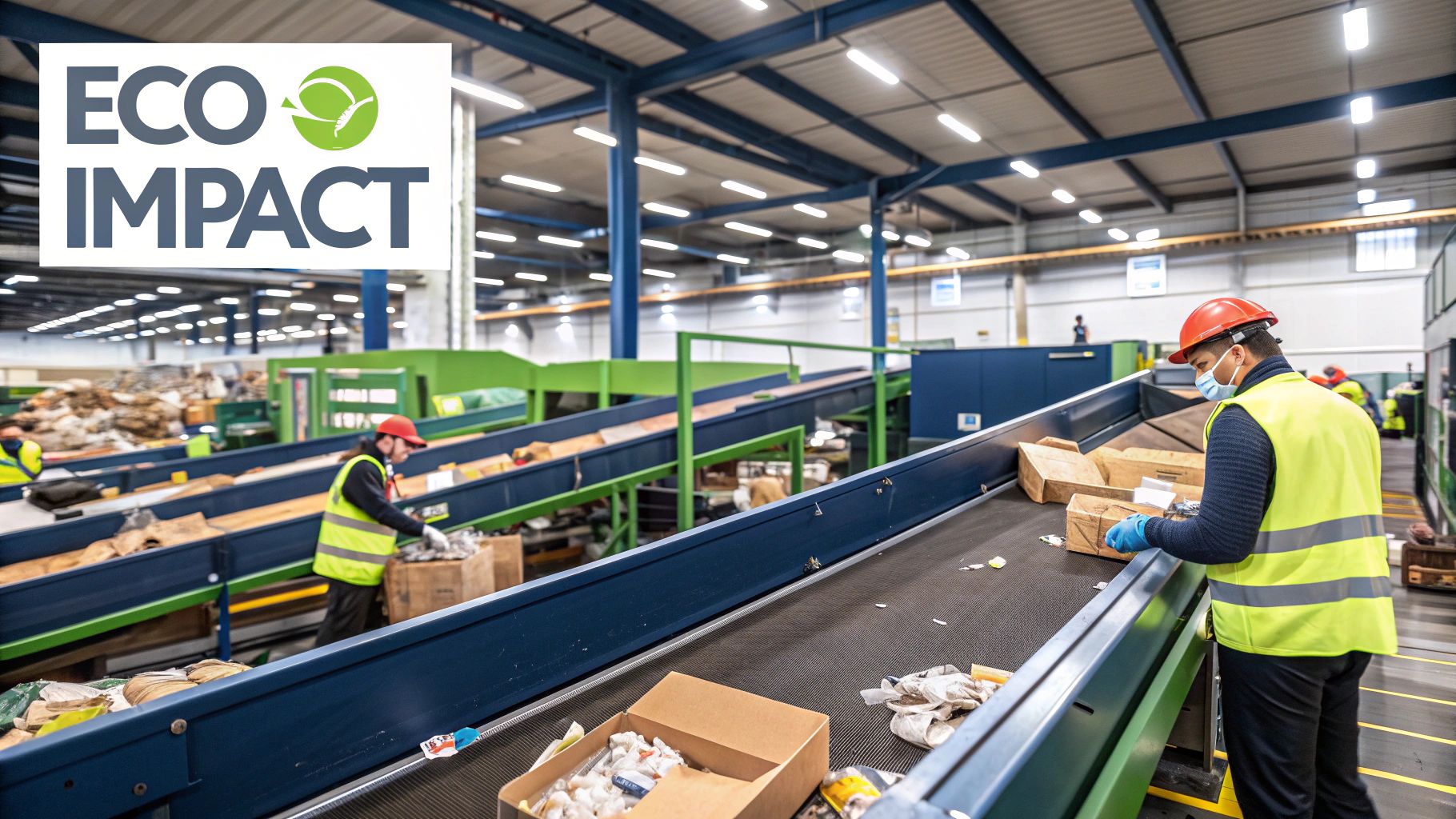 Picking a provider for your commercial waste collection services isn’t just another item to tick off your to-do list; it’s about finding a genuine business partner. Get it right, and you’ll stay compliant and operate smoothly. But the wrong choice? That can lead to overflowing bins, surprise charges, and even legal headaches.
Picking a provider for your commercial waste collection services isn’t just another item to tick off your to-do list; it’s about finding a genuine business partner. Get it right, and you’ll stay compliant and operate smoothly. But the wrong choice? That can lead to overflowing bins, surprise charges, and even legal headaches.
First things first, check their credentials. The absolute non-negotiable is a valid Waste Carrier Licence. This is your proof that they’re legally allowed to handle and dispose of your waste, which is essential for meeting your own Duty of Care obligations.
Once you’ve got the legal basics covered, dig into their environmental commitment. This is a huge indicator of quality. Don’t be shy—ask them directly about their recycling rates and what actually happens to your rubbish after it leaves your premises. A provider who’s proud of their process will have no problem sharing this with you.
Evaluating Service and Support
Price always matters, but it shouldn’t be the only thing you look at. A rock-bottom quote can quickly get expensive if the service is unreliable. Look for a provider with a reputation for top-notch customer support and a bit of flexibility. What happens if your needs change? Can they easily adjust your collection schedule?
Considering UK businesses generated somewhere between 25 to 31 million tonnes of commercial waste each year from 2010 to 2020, having a reliable service is mission-critical. It’s what keeps your daily operations from grinding to a halt.
A big part of this is looking at their green credentials. A provider who champions recycling is a partner who helps you hit your own sustainability targets. If you’re keen to learn more, check out our guide on how businesses can achieve zero waste to landfill.
Choosing a provider is a long-term decision. Prioritise a partner who offers a balance of competitive pricing, proven reliability, and a genuine commitment to helping your business manage its waste responsibly and sustainably.
Finally, get your magnifying glass out for the contract. Pay close attention to the length of the agreement, notice periods, and any potential hidden fees for things like overweight bins or missed collections. Getting good at mastering vendor contract management is key to building a great long-term relationship. Taking the time to choose wisely now will pay you back with compliance, cost savings, and complete peace of mind.
Of course, even with the best-laid plans, a few questions about commercial waste collection always seem to pop up. Let’s tackle some of the most common ones so you can handle your waste with complete confidence.
Can I Use the Council for My Business Waste?
The short answer is no. Any waste your business creates is legally different from the rubbish you put out at home. The law requires you to have a proper commercial waste agreement with a licensed carrier to take care of everything your business throws away.
What Is a Waste Transfer Note and Why Do I Need One?
A Waste Transfer Note (WTN) is the official paperwork that tracks the waste moving from your premises to your collection company. You absolutely must keep copies of these for at least two years, as they are your proof that you’re meeting your legal Duty of Care.
Think of a WTN as a receipt for your rubbish. It’s your legal protection, proving you’ve done everything by the book and passed your waste to an authorised professional for safe, compliant disposal.
Getting these basics right means your waste management will be both efficient and, crucially, fully compliant with the law.
Ready to take the guesswork out of your commercial waste management and make sure you’re fully compliant? The Waste Group provides reliable, clear, and eco-friendly collection services designed for businesses like yours. Get your free, no-obligation quote today at https://www.thewastegroup.co.uk.
